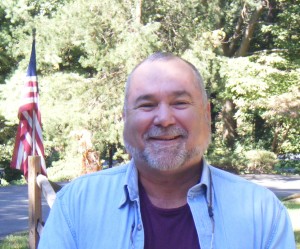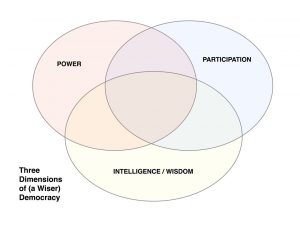
A new wise democracy pattern language
I am immersed in work co-creating version 2.0 of the wise democracy pattern language that we anticipate will be available by mid-April – free online as well as offered in a beautiful boxed set of cards for sale. The new set has most of version 1.0 patterns plus more than two dozen new ones, for a total of 96 wise democracy patterns. You can see the names of all 96 patterns below, grouped as responses to seven overriding questions.
Click Above for Original. Safety Copy Below.
OUTLINE OF WISE DEMOCRACY PATTERN LANGUAGE (WDPL) v. 2.0
Each wise democracy pattern below has been listed under a broad “categorical question” that explores some aspect of the WDPL “prime directive”, which is “to evoke and engage the wisdom and resourcefulness of the whole on behalf of the whole”.
We believe that most of these patterns could easily be associated with more than one of the categorical questions. But we chose to limit each one to one question to bring some order to the entire deeply interconnected set.
The pattern numbers indicate where each patter lies in the sequence when they are listed alphabetically.
Following the full list of patterns, you’ll find a glossary of terms I’ve used in naming the patterns which may be unfamiliar to some people. An asterisk accompanies any pattern name in which one or more words is included in the glossary.
We invite you to explore the full possibilities and implications of each pattern and its ways of serving wise democracy and the WDPL prime directive.
Now here are the seven questions and their patterns:
1. DIVERSITY: How can we include enough diverse people and perspectives?
09 Citizen-Stakeholder Integration*
11 Collective Distributed Intelligence
14 Complex Identity
26 Diversity
27 Enough Time
28 Equity
34 Felt Agency
52 Microcosms and Populations
53 Multi-Media Engagement
56 Multiple Perspective View
60 Out of Many, One
65 Privacy Guarantees
76 Safety First, Then Challenge
78 Sortition*
79 Spaces for Dialogue and Collaboration
87 Universal Participation*
92 Whole System in the Conversation
2. INTERACTION: What kind of healthy interaction can help us generate wisdom and resourcefulness?
01 All Concerns Addressed
08 Circles and Cycles
10 Civil Rights
17 Constraints on Concentrated Power
25 Deliberation*
33 Feeling Heard
38 Generating Shared Orientation
39 Generative Interactions*
48 Integrity and Authenticity
51 Metabolizing Polarization*
58 Nurturing Social Capital*
63 Power of Listening
64 Powerful Questions
66 Proposals and Outcomes Emergent
80 Story Sharing*
85 Transpartisan Inquiry*
3. BIG PICTURE: How else can we see a big enough, full enough picture?
06 Capacitance*
19 Context Awareness
23 Dancing Among Clarity, Inquiry, Mystery
29 Expanding Situational Curiosity
30 Expertise on Tap (Not on Top)
36 Full-Spectrum Information
41 Groundedness
54 Multi-Modal Intelligence
82 Systems Thinking
83 Taboo Awareness
84 Tackling Cognitive Limitations
86 Universal Intelligence*
94 Wise Use of Uncertainty
4. REALIZING POTENTIAL: How else can we tap into the wisdom and energies latent in life’s dynamics?
05 Bringing Understanding to Life
13 Commons and Commoning*
18 Consulting and Abiding by Willingness
37 Fullness of Choice
42 Grounding in Fundamental Needs
44 Healthy Polarity Dynamics*
50 Life-Enhancing Enoughness
73 Restorative Justice
74 Rich Feedback Dynamics
81 Synergy Between Part and Whole
88 Using Diversity and Disturbance Creatively
5. CARING: How can we care in big enough ways?
02 Appreciative Thinking
04 Big Empathy
07 Caring Into Quality
20 Cooperative Ownership as Stewardship
24 Deep Time Perspective*
32 Fair Sharing of Costs and Benefits
57 Nature First
62 Possibility Thinking
75 Sacredness
89 Visionary Attractors
91 Whole Healing
96 Working through Feelings
6. ACTION: How can we get things done in wholesome ways?
15 Connecting Nodes of Life Energy
16 Consent
22 Critical Thinking
31 Exuberance
40 Glocal Subsidiarity*
43 Healthy Competition/Cooperation Dynamics
45 Holistic Leadership and Governance Dynamics*
46 Inclusive Stakeholder Governance*
47 Integral Political Will*
55 Multi-Modal Power
59 Optimizing Freedoms and Constraints
61 Partnership Culture
68 Prudent Use of Power-Over*
70 Range of Tolerance
71 Realizing Essential Aspirations
77 Self-Organization Fostered
90 Well-Utilized Life Energy*
95 Working the Field*
7. SUSTAINABILITY: How can we sustain our wise activities over time?
03 Appropriate Technology
12 Collective Wise Oversight of Governance
21 Creative Experimentation
35 Full Cost Accounting
49 Iteration
67 Prudent Progress
69 Quality of Life Indicators
72 Regenerativity*
93 Wholesome Life Learning
= = = = GLOSSARY = = = =
Capacitance – the ability to abide (more or less comfortably) with/in uncertainty, disturbance, challenge, complexity, conflict, irresolution, etc.
Citizen – a resident or member – especially an engaged or politically active member (whether or not officially certified) – of an established place (community, society, state, world, etc.).
Commons – anything that is openly (or rightfully) shared by all members of a community or society. “Commoning” is the act of creating or claiming, defending and caring for, and mindfully using and stewarding a commons.
Field – a potent energy-space which brings forth and shapes what’s next – e.g., “field of influence”.
Generative – evoking and/or nurturing greater creativity.
Glocal – embracing both global and local – geographically and situationally (e.g., both hometown and planet) and/or cognitively (e.g., both universal and particular).
Deep Time – embracing the full extension of time (and often its evolutionary unfolding), including the distant and recent past, the textured reality and potency of the present, and a broad sense of possibilities and probabilities in the near and distant future.
Deliberation – thoughtful, thorough consideration of the factors relevant in a situation and the possibilities for resolving it, creatively engaging with it, or transcending it entirely.
Governance – the management of collective affairs (institutionalized government being only one approach to or facet of that function).
Holistic – embracing, engaging with and through, and utilizing (a) the whole (of a life, topic, population, situation, resource, etc.) and (b) the dynamics and dimensions of wholeness (e.g., synergy, vitality, spirit, mutuality, flow, resolution, integrity, etc.).
Integral – having diverse parts or aspects well integrated into a coherent whole with its own qualities above and beyond those of its parts or aspects, often to such an extent that the parts or aspects become reflections or manifestations of the whole.
Life Energy – that which motivates a living being, organism or system from within – ranging from urges, feelings and needs to interests, purposes and passions, to values, visions, longings, callings and aspirations.
Metabolize – to transform something (often by deconstructing it) in ways that help get more value from it, when in its original form it would be useless or even toxic.
Microcosm – a group that reflects (to a greater or lesser degree) the diversity or characteristics of a larger community or population.
Polarities – seemingly opposite or incompatible ideas, energies, etc., that are fundamentally related to each other, such that efforts to eliminate or maximize one pole evoke unhealthy manifestations, imbalances or reactions in the other – a dynamic which suggests that we seek, instead, a healthy balance (or even synergy) between them.
Political Will – determination and commitment to a particular approach for addressing a public issue, concern or problem – often, but not only, among diverse players in support of official decision-makers.
Power-over – the underlying dynamics of management, direction, domination, control, destruction, etc.; the effort or capacity to get specific things to happen regardless of obstacles. (Usually contrasted with power-with, or cooperation.)
Regenerativity – the capacity of a living entity to continually renew or promote its wholeness, health and functionality.
Social Capital – interpersonal, intragroup and/or intergroup relationships that can potentially be engaged to address shared concerns or projects.
Sortition – random selection used in political systems and governance.
Stakeholder – any (type of) person, group, or life form that plays a role – or could play a significant role – in a particular realm or situation in which they’re all involved. They all influence and/or are impacted by how it unfolds – and thus they can change what happens next.
Story – a sense, experience or articulation of an event, unfolding of events, or pattern of events – past, present or future – real and/or imagined. This is usually accompanied by an interpretation of those events – of their meaning and their impact on those involved.
Subsidiarity – the principle that governance functions should be managed at the lowest level they can effectively be addressed. Subsidiarity covers all scales but with a bias towards decentralization.
Transpartisan – a person, activity or attitude where secure partisan identity co-exists with open, respectful, curious and potentially co-creative engagement with the other side(s) of a partisan divide.
Universal Intelligence – transpersonal forms of intelligence (cognitive potential or the dynamics or traces of cognition at work) manifesting or accessible in shared cultural, natural, cosmic, and/or spiritual realms.
Universal Participation – the principle (or recognition) of ongoing co-creation by virtually all entities in the unfolding of any given situation – and the implications of that for causality, responsibility, blame, inclusion, etc.

ROBERT STEELE: Tom Atlee has mentored me on Collective Intelligence for seventeen years. I strongly urge one and all to donate to the Co-Intelligence Institute — it and he are making a difference. Click below to donate directly:
http://www.co-intelligence.org/donations.html




